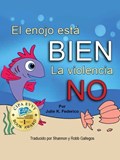Vengan y pasen un día con unos pesitos lindos para aprender qué hacer cuando estemos enojados. ¿Está bien empujar a alguien? ¡No, no lo es! Pero hay muchas cosas que sí están bien. Podemos pintar o jugar fútbol.
En el segundo libro por Julie Federico, se introduce a los lectores el tema de la violencia doméstica de manera relevante y se aprende que El enojo está bien; La violencia no.
Demasiados niños viven en hogares donde existe la violencia doméstica. El libro de Julie Federico, El enojo está bien; La violencia no, contiene la lección que cada niño debe aprender, que todos nos sentimos el enojo, pero que hay maneras saludables para soltarlo, y que la violencia doméstica no está bien. Lo recomiendo mucho este libro a padres, maestros y trabajadores y agencias de la salud mental.
~Lisa Moss, autora de Why Doesn’t She Just Leave?
Anteriormente, Julie Federico fue una consejera en una escuela secundaria. Posee un título bachillerato en asistencia social y un título de maestría en la consejería de Indiana University. Su primer libro, Some Parts are Not for Sharing (Algunos partes no son para compartir), es un libro que introduce la seguridad del cuerpo a los niños.
Clear language and child-friendly art invite a direct, straightforward examination of when anger is appropriate and how to safely express it through art, physical activity, tears. What’s not OK is hitting, biting, throwing and hurting. The book gently and clearly reminds its vulnerable audience that adults can find the journey just as tricky as children do. If an adult hurts a child or someone they love, Federico instructs her young readers that telling a trusted adult is a safe and right action for them to take.
Needless to say, this is complex emotional territory, and Federico’s tone is perfect: even, loving, simple, clear. Educators and caregivers may well find this a helpful tool in eliciting important conversations, and the book includes contact information for The National Domestic Violence Hotline and other respected sources of support.

